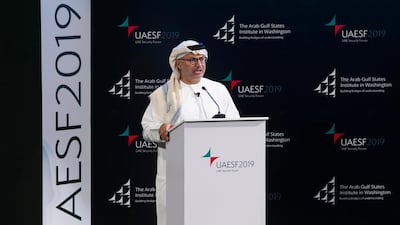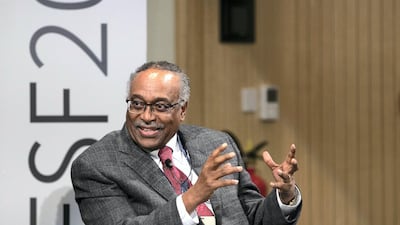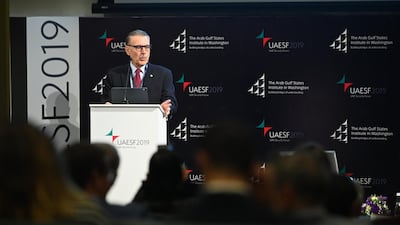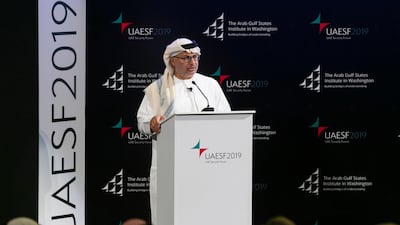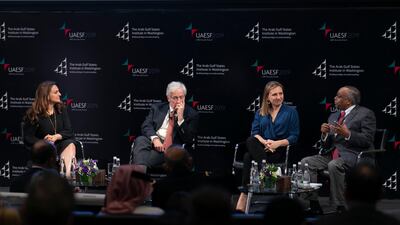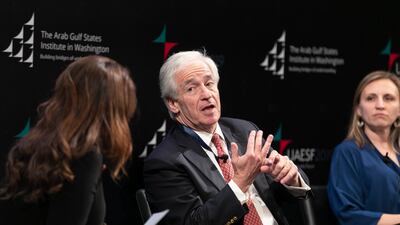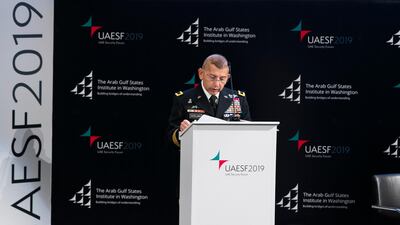The UAE backs Saudi Arabia's plans for creating a group to promote stability, security and development around the Red Sea, the UAE's Minister of State for Foreign Affairs Dr Anwar Gargash said on Thursday.
"There is a new momentum in the region and we should collectively seize this opportunity to formulate sustainable solutions that serve the interest of regional states and meet the aspirations of its people," Dr Gargash said. "We believe that such models will ultimately play an important role in supporting stability and development in the Horn of Africa," he added in a speech at the UAE Security Forum in Abu Dhabi.
The UAE minister said he believes that wider regional integration is one of the most effective approaches to addressing the socioeconomic challenges that deeply affects many areas in the Horn of Africa.
Securing stability in the Horn of Africa is only feasible by regulating economies, investment and trade, he added.
The UAE, the fourth-largest economy in the Middle East, has expressed the need to expand trade ties with fast-growing nations in the Horn of Africa.
Abu Dhabi places significance on the Horn of Africa region, which straddles the Red Sea and Gulf of Aden.
Included in this is the vital Bab El Mandeb shipping channel between Yemen and East Africa.
"Regional peace, stability, and economic prosperity are the main factors that underline the UAE's role in the Horn of Africa," Dr Gargash said.
He said the UAE has played "various constructive roles in the Horn of Africa, and continues to be a strong supporter of international efforts to return peace and stability to the region, through humanitarian, development, as well as security efforts".
A significant role that the UAE has played in the region has been by co-operating with Saudi Arabia to broker a historic peace agreement between Ethiopia and Eritrea in July 2018.
In Sudan, both the UAE and Saudi Arabia assisted in facilitating a deal between the military and civilian groups for a historic transition to democracy, which was agreed in August.
"Sudan now has an exceptional opportunity to turn this transition into a sustainable success model that could become a blueprint for other countries in the region," the UAE official said.
Demonstrations triggered by an economic crisis swept across Sudan last December as people demanded the end of Omar Al Bashir’s 30-year rule.
The army removed him from office on April 11 and in August a joint civilian and military sovereign council was formed to oversee the country's transition to civilian rule, as demanded by protesters.
Dr Gargash pointed to this process, as well as events in Ethiopia, where the UAE helped kickstart the dialogue with Eritrea to end a decades-long animosity that won Ethiopian Prime Minister Abiy Ahmed the Nobel Peace Prize on Wednesday.
“Sudan’s and Ethiopia’s recent achievements demonstrate that we ought to be more ambitious in finding new ways to lend support to diplomatic processes and initiatives that promise to deliver hope,” Dr Gargash said.
He made clear that the UAE wants the transition taking place in Sudan and Ethiopia to be supported as part of a push to assist the region with “our concerted support to relaunch growth and investment while tackling reforms and underdevelopment".
“If the transitions in Sudan and Ethiopia are not managed and supported, the promising transformations that are taking place in the region could be reversed, which will pose great risks for the wider peace and stability,” he explained.
The UAE has also played a pivotal role in undermining the threat of extremist group Al Shabab and have exerted efforts to protect the freedom of maritime navigation in the region.
Dr Gargash said the UAE attempted to combat “piracy off the coast of Somalia and supported inter-Somali dialogue to bring peace and security to the country".
In Yemen, the UAE has also had a central in combating Al Qaeda in the Arabian Peninsula and liberating Aden and many southern provinces as part of the Arab Coalition.
But they “should not be solely seen as counterterrorism efforts targeting Aqap,” Dr Gargash said.
He said these efforts are "integral to targeting and eradicating Aqap's supply lines to Al Shabab in Somalia".
Rebels in Yemen's civil war have on several occasions targeted international shipping and forced the closure of the Bab Al Mandeb that separates west Yemen from Djibouti and Eritrea.
History and geography link the Horn of Africa and the Arabian Peninsula and the regions have shared culture, trade and social relations, Dr Gargash said.
During a Q&A session after his speech, Dr Gargash congratulated the African Union on its effectiveness and the successes in Sudan, where it assisted the deal to form a transitional government, as well as other areas on the continent.
“I have to say that this is an area that we’ve not been as successful as the Arab League, we do have a model for a regional organisation that has been active and relevant but Arab League has not been,” he said. “The UAE likes to work within an effective organisation, we need to learn and understand and see what we can do.”
The minister of state pointed out that the UAE as “a medium-sized country” looked to be a “team player”.
“We don’t have our own solo strategy it would be unrealistic,” he said. But he said the country had its core objectives – fostering stability, counter-extremism and counter-terrorism as well as building economic opportunities.
"Since the formation of the UAE, our engagement with the Horn of Africa has gradually grown and, over the past decade, so has our support to most of the countries in this region," the minister said.
"The time has, therefore, come to reinvigorate our efforts and jointly support the Horn of Africa to turn the page into an era of regional cooperation which will enable it to unleash its full economic potential."
